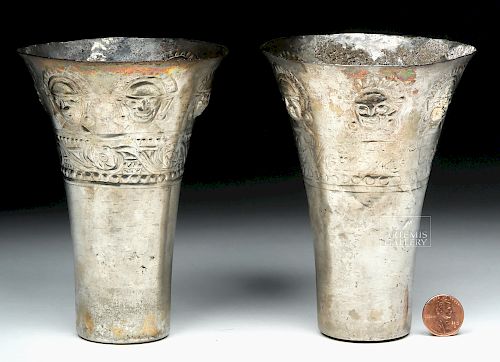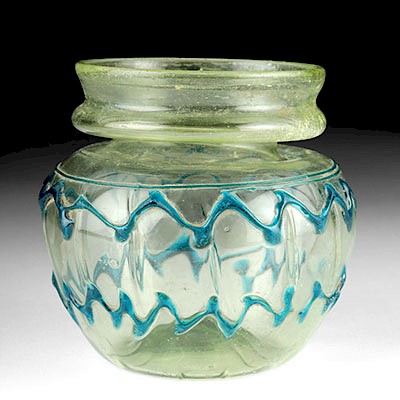Sican Silver Keros w/ Naymlap, ex-Robert Sonin (pr)
Lot 171
About Seller
Artemis Fine Arts
686 S Taylor Ave, Ste 106
Louisville, CO 80027
United States
Selling antiquities, ancient and ethnographic art online since 1993, Artemis Gallery specializes in Classical Antiquities (Egyptian, Greek, Roman, Near Eastern), Asian, Pre-Columbian, African / Tribal / Oceanographic art. Our extensive inventory includes pottery, stone, metal, wood, glass and textil...Read more
Estimate:
$7,000 - $10,500
Absentee vs Live bid
Two ways to bid:
- Leave a max absentee bid and the platform will bid on your behalf up to your maximum bid during the live auction.
- Bid live during the auction and your bids will be submitted real-time to the auctioneer.
Bid Increments
| Price | Bid Increment |
|---|---|
| $0 | $25 |
| $300 | $50 |
| $1,000 | $100 |
| $2,000 | $250 |
| $5,000 | $500 |
| $10,000 | $1,000 |
| $20,000 | $2,500 |
| $50,000 | $5,000 |
| $100,000 | $10,000 |
| $200,000 | $20,000 |
About Auction
By Artemis Fine Arts
Aug 16, 2018
Set Reminder
2018-08-16 10:00:00
2018-08-16 10:00:00
America/New_York
Bidsquare
Bidsquare : Clearance Sale - Ancient / Ethnographic Art
https://www.bidsquare.com/auctions/artemis-gallery/clearance-sale---ancient-ethnographic-art-3368
These lots are going, going, gone... plus a nice selection of lots brand-new to auction! Artemis Fine Arts info@artemisgallery.com
These lots are going, going, gone... plus a nice selection of lots brand-new to auction! Artemis Fine Arts info@artemisgallery.com
- Lot Description
**Originally Listed At $4000**
Pre-Columbian, north coast of Peru, Sican/Lambayeque culture, ca. 750 to 1370 CE. A matching pair of beakers, also known as keros (quero, qero, qiro), made using the lost wax casting technique from very thin sheets of silver. Each has a cylindrical bottom, a flat base, and a gently flared upper portion with a band of relief sea birds below a band of relief heads of Naymlap. Naymlap is the traditional founder of the Lambayeque dynasty, who came from the south by sea and colonized the region before, it was said, sprouting wings and flying off into the sunset. He seems to have been worshipped by his descendants, and silver and gold beakers like these bearing his likeness have been found within the massive pyramid mounds at the center of Lambayeque's greatest cities, alongside mummy bundles and sacrificial victims. Size: 3.7" W x 5.05" H (9.4 cm x 12.8 cm); total weight is 76.6 grams
Silver and other metal vessels were made at Cerro Huaringa, in vast smelting furnaces and workshops. People used these keros to drink chicha, a fermented drink crucial to religious and burial rites as well as ritual celebrations around planting and harvest time. Chica was made from maize, quinoa, or squash, with a local alcohol content and fermented through the use of saliva - women chewed the food and then boiled it in water, leaving the enzymes from their mouths to produce the malt for fermentation.
Provenance: private Hawaii, USA collection; ex Robert Sonin collection, a famous expert on Pre Columbian metal
All items legal to buy/sell under U.S. Statute covering cultural patrimony Code 2600, CHAPTER 14, and are guaranteed to be as described or your money back.
A Certificate of Authenticity will accompany all winning bids.
We ship worldwide and handle all shipping in-house for your convenience.
#131895Patina on surface; light deposits, mainly on the interior.Condition
- Shipping Info
-
All shipping is handled in-house for your convenience. Your invoice from Artemis Gallery will include shipping calculation instructions. If in doubt, please inquire BEFORE bidding for estimated shipping costs for individual items.
-
- Buyer's Premium



 EUR
EUR CAD
CAD AUD
AUD GBP
GBP MXN
MXN HKD
HKD CNY
CNY MYR
MYR SEK
SEK SGD
SGD CHF
CHF THB
THB


















